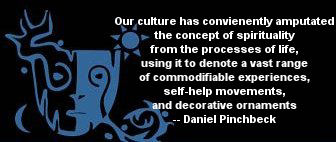|

The Initiation of Perseus
© 2007 Jay D'Ambrosio, M.A.
and used with permission
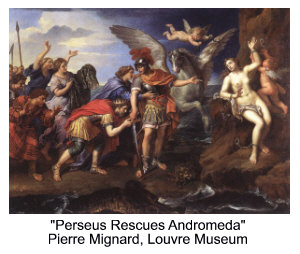 Our world is filled with men who aren't really sure that they are men. During adolescence, boys in our society very often find themselves fatherless. This is due either to absent fathers, or fathers who distance themselves during their sons' adolescent years. Many fathers retreat into busyness and distraction around this time of their sons' lives, usually out of fear. Consider for a moment that the heart-wounds we carry with us as adults were typically delivered in our adolescence. There is something fearful lurking deep within the caverns of our hearts. This creates hesitancy in fathers to engage their sons at a very critical time in their journey. Their son's teenage years just stir up too many fears and insecurities that fathers themselves haven't yet confronted. Our world is filled with men who aren't really sure that they are men. During adolescence, boys in our society very often find themselves fatherless. This is due either to absent fathers, or fathers who distance themselves during their sons' adolescent years. Many fathers retreat into busyness and distraction around this time of their sons' lives, usually out of fear. Consider for a moment that the heart-wounds we carry with us as adults were typically delivered in our adolescence. There is something fearful lurking deep within the caverns of our hearts. This creates hesitancy in fathers to engage their sons at a very critical time in their journey. Their son's teenage years just stir up too many fears and insecurities that fathers themselves haven't yet confronted.
Thus, we have men today who hesitate, just as their fathers before them. There are men who, having not been validated in their youth, are constantly trying to prove their masculinity by the cars they drive, the promotions they achieve, the women they conquer, or the violence they wreak. On the other end of the spectrum, you have men who spurn masculinity altogether, out of a deep anger toward their fathers. Instead of struggling to demonstrate their manhood, they run from it and embrace the world of women. Either way, something important and vital is missing in our modern, secular, world.
If we peer back into the depths of human history, we will see that the initiation of boys happened intentionally. It took place primarily in the presence of the father and/or a company of men. These rites usually involved an ordeal, or challenge, that tested the boy emotionally, physically, and spiritually. If we carefully listen to ancient myths and stories, we can still hear the echoes of this crucial practice of male initiation. Robert Bly brilliantly drew the primeval rites of passage from the fairy tale known as Iron Hans. This article will expand the quest and mine the Greek myth of Perseus for the masculine rites that lay hidden just beneath the surface of the story.
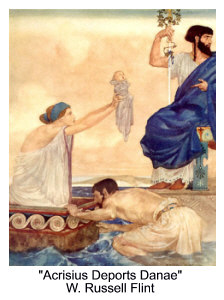 Perseus, son of Zeus, was born to Danae, in the kingdom of his grandfather, Acrisius. Learning from an oracle that his grandson would be the instrument of his death, King Acrisius cruelly sealed his daughter, Danae, and the young Perseus, into a wooden chest and had them thrown into the sea. In the chest, the infant Perseus couldn't see, but he could feel the tumult of the waves that rocked their drifting prison. Similarly, as children, we are at the mercy of forces beyond our control or understanding. Often the waves that toss us are the result of the thoughtless actions and destructive patterns established by our parents, and their parents before them. Perseus, battered by the waves, was in a prison that had been fashioned by his grandfather, Acrisius. Perseus, son of Zeus, was born to Danae, in the kingdom of his grandfather, Acrisius. Learning from an oracle that his grandson would be the instrument of his death, King Acrisius cruelly sealed his daughter, Danae, and the young Perseus, into a wooden chest and had them thrown into the sea. In the chest, the infant Perseus couldn't see, but he could feel the tumult of the waves that rocked their drifting prison. Similarly, as children, we are at the mercy of forces beyond our control or understanding. Often the waves that toss us are the result of the thoughtless actions and destructive patterns established by our parents, and their parents before them. Perseus, battered by the waves, was in a prison that had been fashioned by his grandfather, Acrisius.
Mother and son were eventually rescued by a fisherman named Dictys, when the chest washed ashore the island of Seriphos. Dictys lived a simple life, and eventually became a strong masculine role model for the boy Perseus. Seeing her beauty, the king of the island, Polydectes began to take an interest in Danae. Not wanting his mother to be wed to a malevolent sovereign, Perseus insists that Polydectes relent. Doubting the youth's ability, the manipulative king strikes a deal with Perseus, a deal which required him to slay the hideous Gorgon, Medusa, and return bearing the grotesque head.
Imagine yourself as the young Perseus. The intense fear he felt at the moment he swore the oath to complete this quest had to have been overwhelming. What have I agreed to? I can't possibly do this! How many of us have uttered the same words when confronted with our own Medusa?
 Into this fear steps Athena, the venerated goddess of wisdom and war. At just the right moment, what the Greeks termed "kairos," the goddess enters in to mentor the young man in his time of need. She affirms and validates his quest to slay the serpentine Medusa, as well as bequeathing him a magical shield to aid him in his mission. It is so important for young males, going through the transition from boyhood to manhood, to hear words of affirmation from men they know, respect, and admire. The active intervention of men in this transition is especially needed in this juncture of the masculine journey. Into this fear steps Athena, the venerated goddess of wisdom and war. At just the right moment, what the Greeks termed "kairos," the goddess enters in to mentor the young man in his time of need. She affirms and validates his quest to slay the serpentine Medusa, as well as bequeathing him a magical shield to aid him in his mission. It is so important for young males, going through the transition from boyhood to manhood, to hear words of affirmation from men they know, respect, and admire. The active intervention of men in this transition is especially needed in this juncture of the masculine journey.
On first glance it seems odd that a female deity would play the part of a mentor figure to a young male. However, if you examine the role of Athena in Greek mythology, you will find that in many ways she represented the masculine spirit. Hellenic myths depict Athena being born from the head of Zeus, without a mother to bring her into the world. Zeus represented the ultimate in masculinity and Athena was born from his head, where the spirit was believed to reside. Further, she carried a shield and spear, the vestments of manhood in Greek culture. In Homeric legend, she manifested herself as Mentes, a traveling king, in order to mentor Prince Telemachus at a critical point in his story. Understanding this helps us to understand why she revealed herself to Perseus in such a manner.
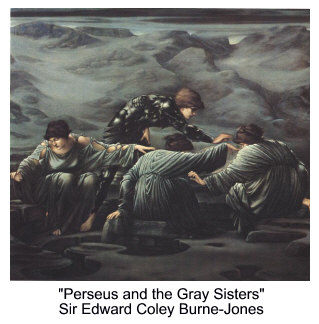 Athena instructs Perseus to seek the three Gray Sisters, so that he may acquire additional vestments of battle. The island where they lived was shrouded in darkness and mist. So it is with the masculine journey. There will be opposition, there will be darkness, but it is in that darkness where answers will be found. It was in the darkness of the island of the Gray Sisters, that Perseus encountered Hermes, the messenger of his father, Zeus. The messenger gave the hero winged sandals, a diamond-edged sword, and later in his story, he came upon Hades' helmet of invisibility. Athena instructs Perseus to seek the three Gray Sisters, so that he may acquire additional vestments of battle. The island where they lived was shrouded in darkness and mist. So it is with the masculine journey. There will be opposition, there will be darkness, but it is in that darkness where answers will be found. It was in the darkness of the island of the Gray Sisters, that Perseus encountered Hermes, the messenger of his father, Zeus. The messenger gave the hero winged sandals, a diamond-edged sword, and later in his story, he came upon Hades' helmet of invisibility.
It is vital for boys who venturing into manhood to receive metaphorical weapons of battle. This means that the dangerous nature of the burgeoning masculine spirit needs to be validated in the presence of older men. What this looks like greatly depends on the boy. If he is not given an opportunity to be fierce by the father, and have that ferocity directed toward noble causes, he will often descend into the destructive violence so prevalent among adolescent males.
Perseus also donned the helmet of Hades to conceal him from the Gorgon sisters. This is significant because Hades represented death and grief. For a boy to truly become a man, he must be acquainted with grief and loss. This may involve coming to grips with the soul-wounds he has received and mourning that which has been lost. As Robert Bly suggests, a man knows how to "shudder," to understand the black side of life. This has to happen, so that he may truly possess a deep appreciation for life.
As Perseus journeys toward the island caverns, the abode of Medusa, he is quietly accompanied by Athena and Hermes. Consider the thoughts and feelings he must have experienced as he entered into the dark enclosed grotto where the Gorgons slept. This imagery surely stirred up the shadowy memories of Perseus' early life, when he was trapped within the wooden chest, close to his mother's bosom. The emotions churned by the tossing of the waves against the box certainly surfaced, this time in an ominous cavern. Here he is once again enveloped by blackness and death. There is a feminine presence here, albeit one that is full of malice. To become a man, the boy will have to descend into his deepest fears. The time for running has come to an end.
Truth be told, we all have a cavern of sorts in our own souls, some black place where we fear to go. It may be something traumatic that happened in our youth, or it may be a loss of something precious to us. Whatever Gorgon lies within, it must be confronted, or it will remain a constant shadow upon the pathways of our lives.
Guided by the divine, Perseus enters the cave walking backwards, looking into the reflection of Athena's shield to avoid the petrifying gaze of Medusa. It is interesting to note that we too must look backward, into the past, for that is where our fears lie hidden. That is where our deepest wounds fester, in the caverns of our hearts. If we do not face them, we are doomed to be plagued by their frightening grip throughout our lives. How many men do you know that end up running from their fears, leaving their families, desperately clinging to illusions that they hope will save them from the great swirling chaos within.
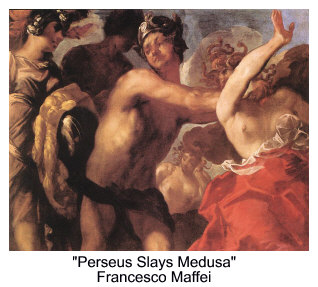 Medusa hissed menacingly as the hero's eyes adjusted to the gloom. Athena and Hermes were both with Perseus; however, they served only as guides. It was time for the hero to know once and for all that he was one. It was time for Perseus to be revealed as the son of Zeus and as a man. It was his time and his alone. This act could not be done in his stead. He drew his bright blade and with one swift motion, slew the fears of his past and forever cleaved his spirit from needy dependence upon the feminine. The sword represents the light of truth shining in the midst of the shadows of the lies we have believed. Medusa hissed menacingly as the hero's eyes adjusted to the gloom. Athena and Hermes were both with Perseus; however, they served only as guides. It was time for the hero to know once and for all that he was one. It was time for Perseus to be revealed as the son of Zeus and as a man. It was his time and his alone. This act could not be done in his stead. He drew his bright blade and with one swift motion, slew the fears of his past and forever cleaved his spirit from needy dependence upon the feminine. The sword represents the light of truth shining in the midst of the shadows of the lies we have believed.
Perseus placed the Gorgon's head with its writhing serpent-hair into a magical pouch and flew away, spirited by the winged sandals of Hermes. His soul was now clearly defined as masculine. He ultimately ends up rescuing the princess Andromeda from the monstrous Kraken, finding courage in the fact that he had triumphed over his fears and had defeated the demons that had once haunted his memories. He now had an inner strength that he could offer the woman, instead of pursuing her in order to fulfill his needs and calm his doubts.
In an age that is desperately in need of authentic masculinity, it saddens one to look around and see how many men in our world carry deep insecurities about who they really are. The ancient pattern of masculine initiation is meant for men of all ages, not only adolescent males. In a society that is more likely to deride masculinity, rather than validate it, the myths of long ago offer an ancient and yet timeless hope.
Jay D'Ambrosio, M.A. is an ancient history teacher and the author of Rethinking Adolescence: Using Story to Navigate Life's Uncharted Years (Rowman & Littlefield Education, 2006), as well as "Egyptian Influence on Early Israelite Literature" (Aeon: A Journal of Myth, Science, and Ancient History, 2005). You can learn more about this topic by visiting Jay's blog at http://eteaching101.blogspot.com.
Read more articles in Mythic Passages by Jay D'Ambrosio
Return to Mythic Passages Menu
Subscribe to the Mythic Passages e-magazine
|
